Axis 1. Cultural, educational and creative industries: reconfiguration of sectors and emerging logics
Responsible : Philippe Bouquillion
Responsible 2 : Christine Chevret-Castellani
Within axis 1, the research carried out is centered on the industrialization of culture, information and communication; on the socio-economic models of the cultural, educational and creative industries; on the phenomena of concentration and financialization; on the modes of articulation between sectors, but also between industry and crafts or self-production.
Research also focuses on public policies and regulation, which are analyzed from three angles. First, public policies promoting cultural diversity and the so-called “French cultural exception” are studied, particularly in the film and audiovisual industry. Similarly, research focuses on public support for independent recorded music labels, while in the book industry, the strength is put on the defense of the single book price or the promotion of independent booksellers. Some of this research is conducted in close collaboration with the Department of Studies, Forecasting, Statistics and Documentation of the Ministry of Culture. Secondly, following work on the national and international promotion of the concept of “information society”, research is now being carried out on the regulation of digital technology, “artificial intelligence” and the processing data algorithms. A focal point situating the balance of power between public institutions and actors in the digital industries involves intersecting discursive and socio-economic approaches. Thirdly, the issues of public policy for the organization of sectors (fringe oligopolies) and labour (the “pool of talent”) are discussed, and in particular the subsidization of production or that of distribution. Similarly, the way public policies weigh on the entry of actors in the digital industries at different levels of the cultural industry sectors, from creation to dissemination, is studied. The balance of power between actors in the communication industries and actors in the cultural industries are modified by these policies.
The work in this axis combines sectoral analyzes relating to the main sectors and fields of cultural industries (press, publishing-bookstore, educational industries, museum productions, performing arts, audiovisual, cinema, digital arts, video games, design, crafts, etc.) and cross-sectional analyzes of these various sectors. This approach is a sine qua non for a study of the modes of industrialization, commodification and adaptation of these sectors to international contexts. These cross-sectional analyzes allow to examine how in these different sectors, the methods of creation, production, reproduction, distribution, promotion, development evolve following various movements, including the entry into these markets of the major players in the digital industries (the GAFAM in particular) but also the deployment, confirmed since the 2010s, of algorithmic data processing, massive data production, deep learning and artificial intelligence systems. These devices and processes are considered both as material realities and ideal realities in the sense of Maurice Godelier. This leads to questioning the socio-historical frameworks of occurrence of these devices, the representations they produce but also the strategies of the actors who seize them and the way these devices renew the balance of power between players. Ttaking these questions into account is at the heart of the current questions about the changes in industrialization and the regulation of culture.
The approaches conducted within this axis have the specificity of putting the cultural industries into perspective with other activities. Thus, as an extension of the questioning of the relationship between cultural industries and digital industries, we are developing research on the so-called movements of “economization” of culture and “culturalization” of economy. How do cultural businesses incorporate modes of operation pertaining to non-cultural industries and how do non-cultural businesses import usual modes of operation within cultural industries and tend to become industries of symbolic goods? In the same way, historically, the work carried out within the LabSIC, especially that of Pierre Mœglin, contributed to the construction of the theory of cultural industries based on empirical findings and notions forged by studying educational industries. The notions constructed to think about educational industries were then extended to cultural industries. Today, the processes of industrialization of education and teaching are studied through different prisms, including that of the role of industrial actors (for example “EdTech”), that of the discourses and practices of public institutions (for example, the injunctions to evaluation as well as performance in higher education), that of the place of technical tools (for example digital education and training devices). Cultural industries, educational industries and creative industries, but also digital industries form a whole whose interactions are at the heart of our research.
The dynamic of this research also leads to linking the previous questions with that of the territorialization of cultural, educational, creative and digital activities in order to study how the movement of transformation of cultural enterprises or also of non-cultural enterprises into symbolic goods industries can promote enhancements through territorial insertion, like Smart Cities in Mauritius or urban wastelands in Detroit. The links between the land economy and that of culture and digital are thus studied. Similarly, the phenomena of transnationalization that cross the cultural, educational and digital creative industries occupy a central place in the work of the axis. Research can focus on the countries of the North but particular emphasis is placed on the Global South and especially on Latin America, the greater Asia-Pacific-Indian Ocean region and the countries of the so-called Mena region (Middle East, North Africa ). The work may focus on the methods of structuring the cultural, educational, creative and digital industries in these geographical areas, but also on the contribution of the actors, content and services produced within these spaces to global cultural flows. Questions related to platforms, artificial intelligence, algorithmic data processing, crypto-currencies, blockchain, and integration into infrastructures including the Cloud are particularly acute and renew the issues of hegemony.
Finally, the research inscribed in this axis refers to the political economy of communication and its critical anchoring insofar as they combine the study of the material conditions of production (socio-economic and political issues) with the study ideological and societal issues. In doing so, different methodologies are mobilized, including socio-economic, socio-political and usage approaches, but also the analysis of discourses and representations, and articulated according to differentiated pairings according to the issues with which the research is confronted. The different forms of “modalization” including socio-economic models or the paradigms of the industries of symbolic goods hold an important place in research both to structure empirical work and to contribute to the permanent task of questioning and updating the theory of cultural industries. The founding works are thus confronted with new empirical realities but also with other scientific approaches, very present in the international scientific space, and which also make of the cultural, educational, creative and communication industries their privileged field. These approaches include Infrastructure Studies, Science Technology Studies (STS), Platforms Studies, platform capitalism, Data Studies. These approaches, although extremely different from each other, have in common to constitute theoretical challenges for works referring to the theory of cultural industries. Moreover, many of the research projects based on these approaches display critical ambitions. This theoretical confrontation allows the work carried out within this axis to avoid epistemological compartmentalization and allows constantly renewed dialogues with French and foreign colleagues.


Publications
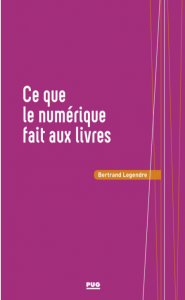
LEGENDRE B. (2019), Ce que le numérique fait aux livres, Presses Universitaires de Grenoble (142 p.)
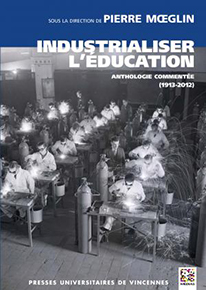
MOEGLIN, P., dir. (2016), Industrialiser l’éducation. Anthologie commentée (1913-2012), dir, Paris, Presses universitaires de Vincennes, 389 p.
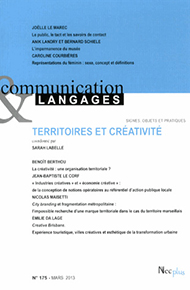
MOEGLIN, P. (2015),« Pour une économie politique de la création. De la trivialité à la créativité », Communication & langages, vol. 2015, n°185, pp. 49-66.
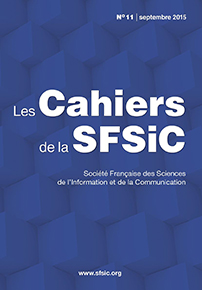
WIART, L. (2015), « Réseaux socionumériques de lecteurs : modes d’utilisation et logiques de sociabilité », Les Cahiers de la SFSIC, n°11, septembre 2015, pp.59-72
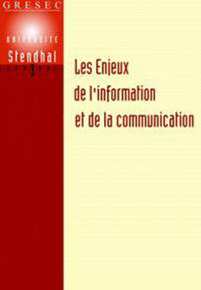
BOUQUILLION Ph., MIEGE B., MOEGLIN P. (2015) « Industries du contenu et industries de la communication. Contribution à une déconstruction de la notion de créativité », Les enjeux de la communication, Décembre 2015, https://lesenjeux.univ-grenoble-alpes.fr/2015-supplementB/01-Bouquillon-Miege-Moeglin/index.html

BULLICH V : « Régulation des pratiques amateurs et accompagnement de la professionnalisation : la stratégie de YouTube dans la course aux contenus exclusifs », Les Enjeux de l’Information et de la Communication, automne 2015, [en ligne] URL : http://lesenjeux.u-grenoble3.fr/2015-supplementB/02-Bullich/index.html
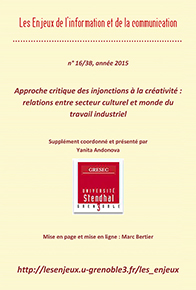
ANDONOVA Yanita (2015), coordination du supplément « Approche critique des injonctions à la créativité : relations entre secteur culturel et monde du travail industriel », Les Enjeux de l’information et de la communication, Gresec, Université Stendhal-Grenoble, 132p. URL : https://lesenjeux.univ-grenoble-alpes.fr/2015-supplementB/Enjeux-SupplB2015.pdf
ROBIN Ch., Démocratisation culturelle, numérique et web, le cas de la filière des livres, Carnet de recherches du Comité d’histoire du Ministère de la culture et de la communication sur les politiques, les institutions et les pratiques culturelles, http://chmcc.hypotheses.org/826, mis en ligne novembre 2014

ABENSOUR C., (2014) “L’autoproduction en édition scolaire. Ou comment le geste de survie de quelques micro structures modifie la culture de l’édition scolaire”, Les Enjeux de l’information et de la communication, n°14/1, p.63-73
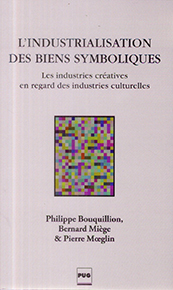
BOUQUILLION Ph., MIEGE B., MOEGLIN P. (2013) L’industrialisation des biens symboliques. Les industries créatives en regard des industries culturelles, Grenoble, Presses Universitaires de Grenoble.

LABELLE S (coord.), « Territoire et créativité », Communication & Langages, n°175, mai 2013.
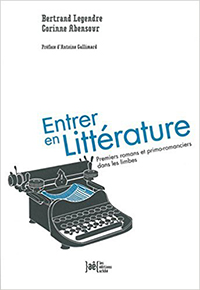
ABENSOUR C., LEGENDRE B. (2012) Entrer en littérature. Premiers romans et primo romanciers dans les limbes, Paris, Éd. Arkhé, 160 p.
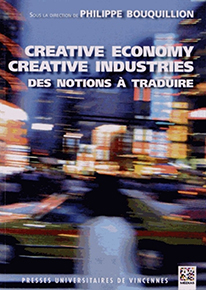
BOUQUILLION Ph. (2012) « Les industries et l’économie créatives : des transformations radicales des politiques publiques culturelles ? », in Ph. Bouquillion (dir.), Creative Economy, Creative Industries : des notions à traduire, , pp. 241-257.
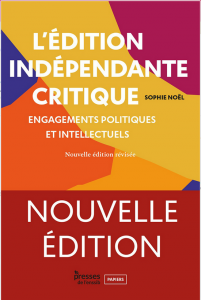
L’édition indépendante critique
engagements politiques et intellectuels
| (nouvelle édition révisée) Sophie Noël |




